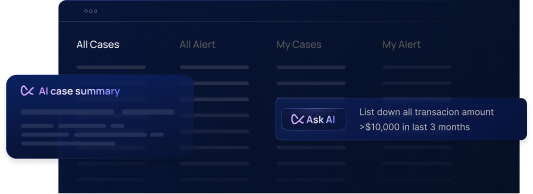Financial crime is a serious problem for the financial industry. Financial concerns have suddenly risen to the top of the agenda across a wide range of businesses, including fintech, banking, eCommerce, and more. PwC estimates that financial crimes cost the studied companies an astounding $42 billion annually. Furthermore, 13 percent of the surveyed companies reported losses from financial fraud totaling more than $50 million, easily enough to drive out even large-scale companies.
What Is Financial Crime?
Financial crime is a broad term that covers a wide range of activities. These include fraud, bribery, money laundering, and terrorist financing. The problem has grown in recent years and threatens the stability of our global economy. Financial crimes can be committed by individuals or organizations with no direct connection to one another—they're not limited to state actors like terrorists or drug cartels; they can also include corporate malfeasance (like insider trading) on an industrial scale.
Because financial crimes are so widespread across all segments of society, they have become part of everyday life for many people around the world—and this makes them harder than ever before for law enforcement agencies to detect before they cause real harm. Financial crime is an issue that all financial industries need to take seriously for financial, practical, and even moral reasons.
Negative actors continue to adapt despite attempts by regulators and authorities to continuously expand their strategies to combat financial crime, which results in increasingly advanced threats and attacks in the fields of money laundering, financing of terrorism, and general fraud.
Additionally, even though regulators are constantly coming up with new ways to adapt to the constantly changing world of financial crime, criminals can sometimes do so even more quickly, meaning that even the savviest and well-intentioned authorities often fall behind. Financial institutions must now actively participate in the battle against financial crime by monitoring, investigating, and reporting any suspicious activity.
Some Common Types of Financial Crimes
Financial crime is a broad term that includes many different types of criminal activity. It can be committed by individuals or by large organizations, and it can take place online or off. Here are some examples:
- Fraud: is a deliberate act of deception intended to give the offender an unauthorized benefit or to deny the victim a right. Tax fraud, credit card fraud, wire fraud, securities fraud, and bankruptcy fraud are all examples of fraud. Fraudulent conduct can be committed by a single person, a group of people, or an entire company.
- Money laundering: is the illicit practice of disguising huge sums of cash obtained through criminal activity, such as the financing of terrorism or drug trafficking, as coming from a legitimate source. The technique "launders" the money, which is thought to be dirty as a result of the criminal activity, to make it appear clean.
- Bribery: is when anything of value, such as money, is exchanged illegally with the intention of influencing the behavior of officials.
- Identity theft: The act of obtaining another person's personal or financial information with the intent to use it to perpetrate fraud, such as carrying out unlawful transactions or purchases, is known as identity theft. Identity theft can be committed in a variety of ways, and the victims often suffer consequences to their reputation, wealth, and credit.
- Terrorist financing: After the terrorist events of September 11, 2001, the United States Congress passed the USA PATRIOT Act (often referred to as the "Patriot Act"), which makes it a federal crime to knowingly facilitate or finance terrorism.
- Embezzlement: refers to the illegal practice of transferring money from one financial account to another. When carried out on a bigger scale, embezzlement schemes frequently involve other financial crimes, such as money laundering.
These are a few of the broad areas of financial crime that are regularly investigated and then prosecuted. All types of financial crime should be taken seriously, but financial fraud, money laundering, and financing terrorism represent the biggest threats.
Some Regulatory Agencies
Most governments have established regulatory agencies committed to combating fraud, money laundering, and terrorism financing.
These agencies include, among others:
- United States: Financial Crimes Enforcement Network (FinCEN) in the US
- United Kingdom: Financial Conduct Authority (FCA)
- Germany: Federal Financial Supervisory Authority (BaFin)
- France: Financial Markets Regulator (AMF)
The majority of other nations also have equivalent financial crime-fighting institutions, particularly those in the West. Many international organizations, such as the IAFCI, also focus on financial crime, while it is frequently challenging to directly prosecute some forms of criminal conduct due to jurisdictional constraints and other factors.
How Do Criminals Commit Financial Crimes?
Criminals utilize a variety of techniques to perpetrate financial crimes. These crimes can harm businesses, people, and other important parties in a variety of negative ways if they go unpunished.
The methods used by these criminals to stay one step ahead of the game are becoming more sophisticated as detection and prevention techniques advance. This compels governments to enact more extensive laws pertaining to fraud, anti-money laundering (AML), counter-financing of terrorism (CFT), and harsher penalties for companies that fail to comply.
Here are a handful of the most popular techniques used by criminals:
- Avoiding patterns: Criminals are fast to discover the types and sizes of transactions that raise AML red flags. They react by engaging in smaller transactions across a variety of financial instruments, dodging the patterns that would draw AML attention.
- Geographic regulatory variations: To escape detection, criminals may search for gaps in AML regulations in various countries. They may then change the way they transfer money across borders to exploit these regulatory loopholes and evade detection.
- Insiders: Employees of financial institutions may be persuaded to ignore suspicious activities by paying incentives or making violent threats. This allows criminals to launder money unnoticed.
- Third-party participants: Innocent individuals, who are usually poor or disadvantaged, may also be persuaded by criminals to carry out money-laundering operations on their behalf by offering a reward or posing a threat.
Numerous financial crime schemes will use a complicated combination of various tactics to avoid detection, frequently employing many of the illegal channels outlined above (among others). Furthermore, once prosecutors start to learn about their bigger plans, their strategy frequently changes.
Taking Action Against Financial Crime Threats
- Know the risks.
- Know your customers.
- Know your employees and any third parties that interact with them, like suppliers or business partners (like lawyers).
- Know the technology you use to conduct business (including financial systems), as well as how you store data on those systems and where it’s stored physically within your organization or server farms in case of a breach.
- From an ethical standpoint, understand all financial transactions that occur inside your company — so you know where to draw the line when it comes time for an audit discovery process or regulatory investigation later down the road when things go wrong because someone forgot about something important!
Flagright’s Solution to Fighting Financial Crimes
Financial crime is a serious threat, and it poses an ongoing risk to financial institutions. But by taking the appropriate steps, you can protect your business's assets, reputation, and future.
The good news is that cutting-edge AML compliance infrastructure tools, like Flagright, considerably outperform traditional solutions. Solutions like real-time transaction monitoring, dynamic risk assessments, crypto and sanctions screening, customer risk profiling, and KYC/KYB orchestration can be combined and customized to respond to evolving fraudulent techniques, supporting compliance across crypto and stablecoin activity. Along with a flexible pricing plan that is usage-based and can scale with your business's growth.
Schedule a free demo with us to learn more about how Flagright can assist your company in preventing and fighting financial crimes.




.svg)










.webp)










